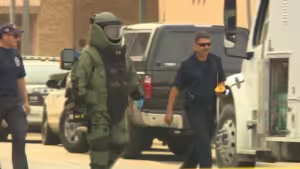
‘The bomb threat maker knows there isn’t a device. They just like being disruptive,’ says security expert
The news that a number of bomb threats against some Canadian schools, universities and colleges earlier this week were all hoaxes doesn’t come as a surprise to security expert Dr. Steve Albrecht.
He argues there’s a critical difference in the intentions of people who make bomb threats and actual bombers.

“The bomb threat maker doesn’t typically have any desire to blow up the building, the bomber does. In fact, the bomber does not want warning and does not want his device to be found, whereas the bomb threat maker knows there isn’t a device. They just like being disruptive,” said the San Diego-based school and workplace violence expert.
Multiple threats on the same day
The threats resulted in the evacuations of all schools and universities on Prince Edward Island., as well as three college campuses in Nova Scotia, on Wednesday. A similar threat in Winnipeg on the same day didn’t result in any lockdowns or evacuations. On Thursday, schools in three regions of Nunavut were closed due to a bomb threat, but reopened after lunch.
In less than a week this summer, WestJet and Air Canada were hit with a total of six bomb threats. All were hoaxes.
Albrecht is a former police officer and he says there’s a lack of understanding from just about everybody about the motives of bomb threat makers and bombers.
“There’s a vast difference in the goals for these two people. The problem I think is first responders and people on the outside, in the media and the public, think they are the same,” he said.
Albrecht points to people like the Unabomber, Timothy McVeigh, and the brothers behind the Boston Marathon bombings as typifying bombers in that they carried out the attacks without providing advance notice to authorities.
Bomb threat numbers
It’s difficult to determine how many bomb hoaxes the police must deal with on a daily or yearly basis. Statistics Canada, which gathers crime statistics for its Uniform Crime Reporting Survey, doesn’t have a separate category for threats. Instead, if the threat is a hoax, it will be classified as mischief and grouped in with all other mischief-type offences.
The jail sentences for mischief under the Criminal Code range from a fine to life imprisonment.
In Halifax since 2010, Halifax Regional Police have responded to 67 bomb threats. Police said a Freedom of Information request would be needed to figure out how many of those instances were hoaxes or resulted in charges.
The Loki 7 P.E.I. bomber
There’s at least one recent instance in Canada where a bomb was found after a person made a threat. Roger Charles Bell, a P.E.I. man known as the Loki 7 bomber, carried out a string of bombings. In 1995, he phoned police with a tip about one he placed at a Charlottetown propane station, which they found and removed.

Law enforcement officials say assessing the credibility of a bomb threat is difficult.